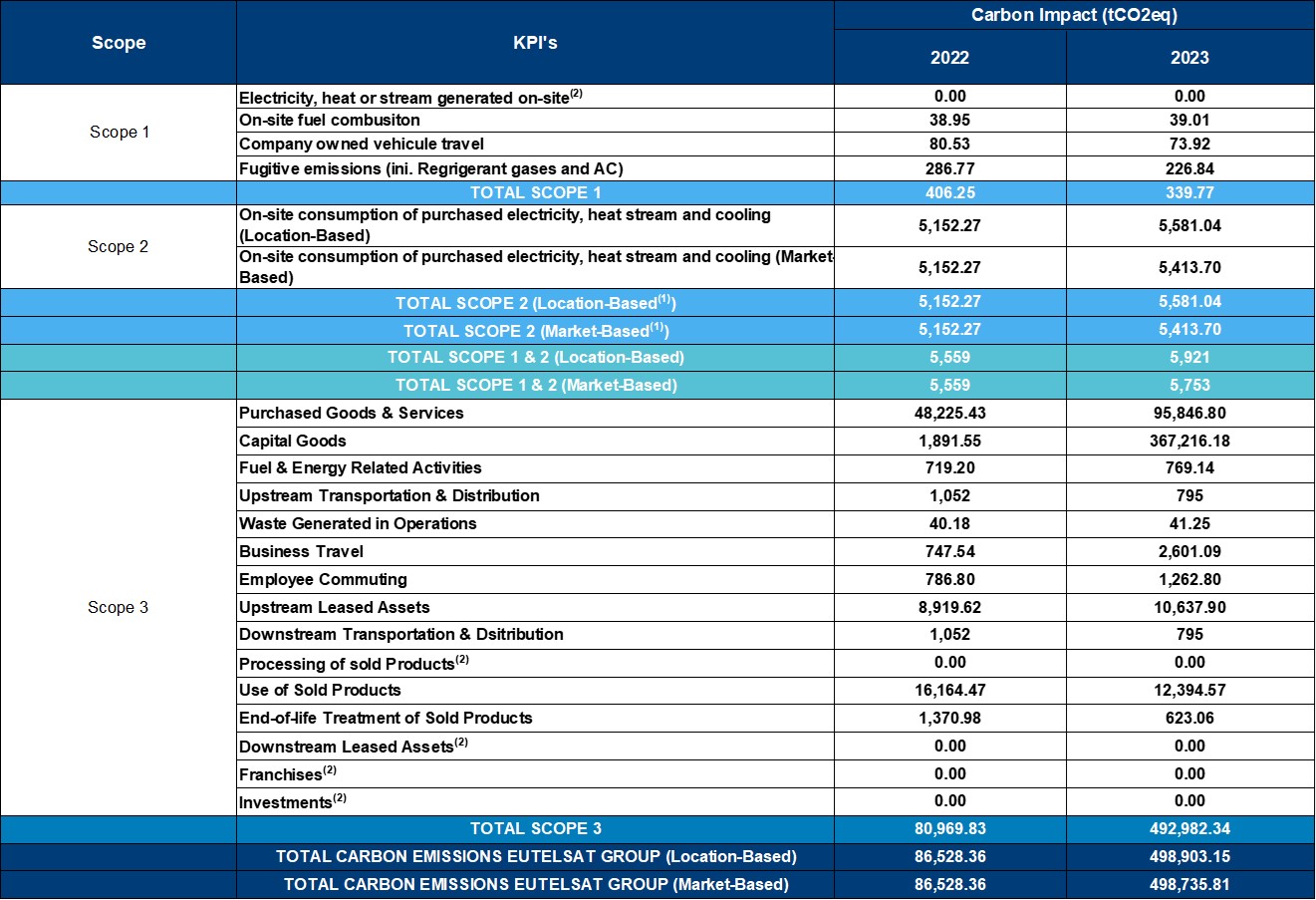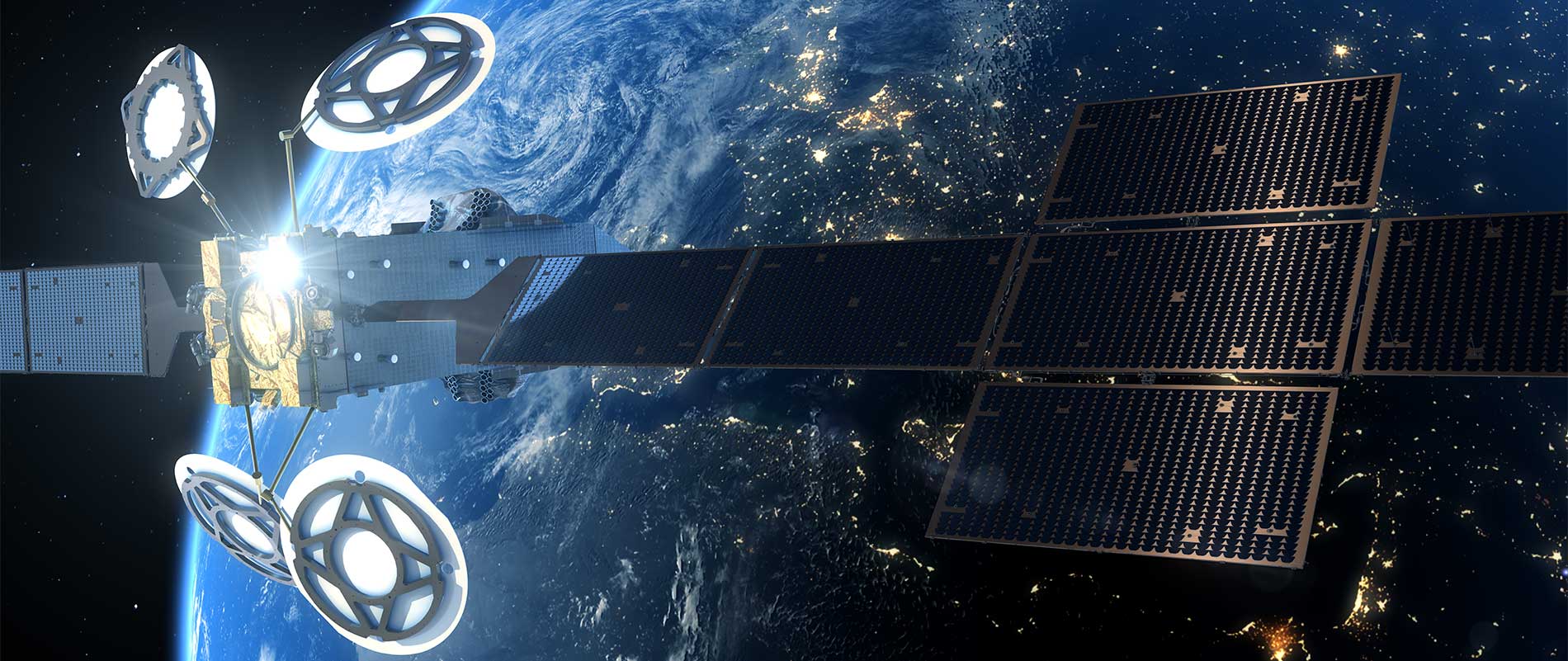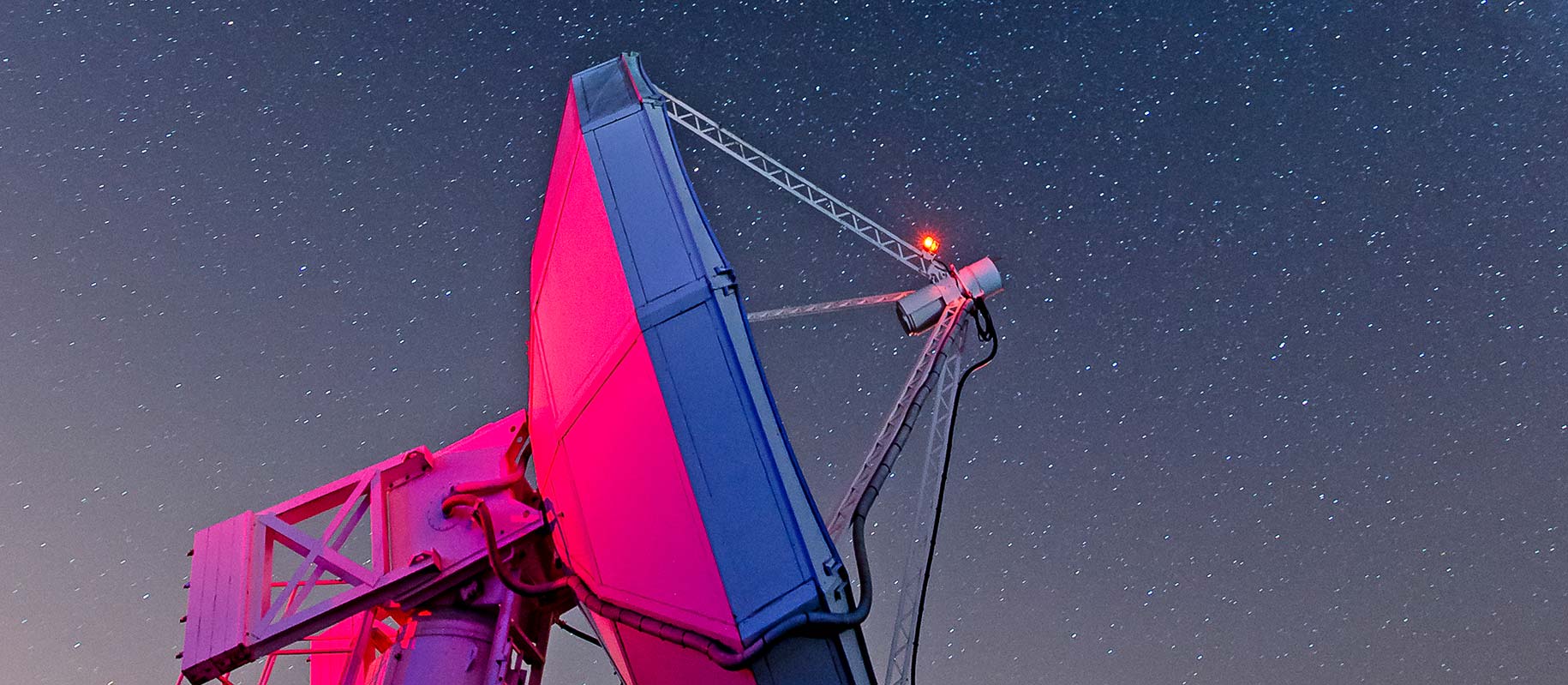
"Sustainability is the cornerstone of our strategy, not just a box to tick. We firmly believe that prioritizing social and environmental well-being strengthens our long-term success, and our actions reflect this belief.”
Eva Berneke, Eutelsat Group CEO
We are committed to the responsible use of space
![]()
Ensure the long-term sustainability of space operations by minimizing the risk of collisions and ensuring that no space debris is created during nominal operations of the Eutelsat fleet
- Create zero debris in any protected region as a result of Eutelsat Geo activities
- Become the first satellite operator to obtain the EU Safe Label Certification
We bridge the communications divide across the world
![]()
Act as a neutral, independent platform to distribute video content and provide connectivity to those in unconnected areas around the world.
- Connect 1 million unconnected people in Africa by 2027.
We care about the environment, on Earth and in Space
![]()
In January 2025, the Science Based Targets initiative (SBTi) validated Eutelsat Group's near-term targets, reaffirming our commitment to ambitious climate action. This milestone underscores our dedication to aligning with the Paris Agreement and achieving significant reductions in greenhouse gas emissions by 2030.
We care deeply about the environment—on Earth and in Space—and place its protection at the heart of our decision-making processes. Here are the approved targets to reduce Eutelsat's carbon footprint (tCO2eq):
- A 50% absolute reduction in energy-related GHG emissions (Scopes 1+2) by 2030, using 2021 as the baseline year.
- A 52% reduction in satellite carbon intensity per Mbit/s (Scope 3) by 2030, within the same timeframe.
Our ongoing efforts reflect Eutelsat's role as a responsible and forward-thinking player in the space industry, working towards a sustainable future.
We respect all our people, customers and partners
![]()
We respect all our people, customers and partners, embracing diversity, fostering inclusion and striving to ensure equal opportunities for all.
- We are targeting an increase in female representation within the workforce. A target for the new Group horizon 2027 will be set in the second semester of 2024.
Explore our Sustainability Report for 2023-24, published in the Universal Registration Document.
Discover how Eutelsat is dedicated to sustainable practices, our commitment to carbon reduction targets and environmental stewardship, and our impactful contributions to social responsibility.
Check out our GRI Content Index and ESG 2023 indicators below.
As a signatory to the United Nations Global Compact since 2019, Eutelsat Group makes significant contributions towards advancing 9 Sustainable Development Goals (SDGs). Through our commitment to sustainable operations, we strive to address the evolving needs of society while actively working towards achieving these important global objectives.


Watch Thomas Cardiel, our Group Director of Investor Relations, share how Eutelsat Group goes beyond financial value creation, by focusing on its economic, environmental, and social impacts.
Eutelsat Group undergoes evaluation by ESG rating agencies, which assess the company's sustainable development policies and accomplishments using their sector-specific methodologies.

BBB
Maintenir des normes de gouvernance d'entreprise de tout premier niveau

64/100
Bronze certification

11.4
Low ESG risk

52/100
Score above the sector average

36/100
Score above the sector average

B
Score reflecting proactive measures for environmental management
Space Management
Eutelsat Group operates satellites in both geostationary orbit 35,786 kilometres (22,236 miles) above the Earth along the Equator, and in low Earth orbit approximately 1,200 kilometres (746 miles) above the Earth. The space debris management policies applied to these two different regimes are tailored to the specific needs and constraints of each orbit environment as described below.
The space debris management policies implemented by Eutelsat Group for many years makes the company a responsible global satellite operator maintaining high standards and making constant efforts to protect the Earth’s orbital environment and the sustainability of space operations.
We work in close partnership with satellite manufacturers and launch service providers to mitigate satellite satellite’s environmental impacts.
Space debris management policy for geostationary satellites
Eutelsat Group’s geostationary satellites operate 35,786 kilometres (22,236 miles) above Earth. At end-of-life (15 to 20 years), they are moved to a graveyard orbit, 300 kilometres beyond geostationary orbit, using allocated on-board propellant. This ensures they do not re-enter the GEO protected region (GEO +/-200 km) or the Earth’s atmosphere.
Throughout their operational lives, including decommissioning, these satellites comply with the French Space Operations Act and international regulations. Since the early 2000s, Eutelsat Group has implemented a responsible space debris management policy, combining operational experience with international recommendations. Our GEO satellite operations are certified ISO 9001 and ISO 27001.
In 2005, we established a Space Debris Mitigation Plan, aligned with international and European guidelines, and the French Space Operations Act. This Plan outlines requirements for end-of-life operations, passivation, and minimizing collision risks.
To date, we have re-orbited and passivated nearly 30 satellites at end-of-life, with a near 100% success rate, all in compliance with international guidelines and the French Space Operations Act. We assess collision risks using data from USSTRATCOM, the EU SST anti-collision service, and the Space Data Association database.
Eutelsat Group remains committed to sustainable space operations and minimizing space debris. Eutelsat is a founder member of the Net Zero Space initiative launched by the Paris Peace Forum, for the creation of a sustainable space environment by 2030 and a signatory of the ESA’s joint statement for a responsible sector.


Space debris management policy for Low Earth Orbit satellites
Eutelsat Group’s first generation (Gen 1) OneWeb LEO constellation comprises 12 planes, each with up to 48 operational satellites. These satellites operate at an altitude of 1,200 km, with planes separated by 4 km for passive safety. Satellites are typically launched in batches of 34 to 40 and are injected into orbits between 450 km and 600 km. They then use electric propulsion to reach their mission orbit, with some remaining at 600 km temporarily.
At end-of-life, satellites de-orbit to around 250 km. Before atmospheric re-entry, their fuel tanks are emptied, batteries discharged, and onboard computers powered off, rendering them non-manoeuvrable. The Gen 1 OneWeb LEO satellites include features for potential de-orbiting or servicing via Active Debris Removal (ADR), with a demonstration mission by Astroscale expected in 2025. No debris is intentionally released during any mission phase.
The typical on-orbit lifetime for these satellites is 6.5 to 9 years, with the LEOP and EOR phases taking 6 months and deorbit phase about 1 year. Satellites operate in compliance with the UK Outer Space Act 1986 and the Space Industry Act 2018, adhering to international standards.
The constellation is managed with a highly automated ground system, using algorithmically standardized manoeuvre sequences, validated automatically and screened against up-to-date space object data from sources like the United States Space Force’s 19th Space Defense Squadron and LeoLabs. Eutelsat has established bilateral Space Traffic Management (STM) agreements with other major space constellations and has co-published best practices with SpaceX and Iridium.
To date, thanks to Eutelsat Group’s LEO fleet management system and operating principles, the team has successfully deorbited 2 satellites, orbit raised more than 600 satellites, automatically planned half a million manoeuvres, including risk mitigating ones, and monitored and managed more than 3 million crossings with neighbouring space objects.
Exemplary Space Traffic Management standards
OneWeb’s Space Traffic Management guidelines ensure collision risk management far exceeds industry standards. This dedication was recognized in 2024 with a Platinum rating by the Space Sustainability Rating initiative, reflecting our commitment to responsible space stewardship.

Digital Inclusion
Combining GEO and LEO capabilities for sustainable connectivity
Since the merger of Eutelsat and OneWeb, our integrated GEO-LEO capabilities now offer resilient hybrid global and regional services that promote sustainable development. These advancements will unlock new applications, benefiting our customers, partners, and the broader ecosystem while addressing connectivity challenges in the most remote locations. This marks the beginning of our renewed mission to be the most trusted partner in satellite connectivity, driving progress and bridging the digital divide with a commitment to societal responsiveness.
We recognize the significance of addressing the disparities in access to Information and Communication Technologies (ICTs) on a global scale. As part of our CSR mission, we are dedicated to pursuing extensive efforts to overcome the “digital divide” that hinders individuals and communities from benefiting from the opportunities presented by broadband access and satellite television broadcasting.
In February 2025, Eutelsat Group reached a major milestone by fulfilling its Partner2Connect Digital Coalition pledge two years ahead of schedule, connecting one million underserved people in Sub-Saharan Africa to reliable satellite broadband. Backed by the International Telecommunication Union (ITU), this achievement highlights Eutelsat’s commitment to digital inclusion and the UN’s 2030 Sustainable Development Goals (SDGs).
Discover how Konnect satellite broadband solution transforms lives in the most remote areas of DRC.
Our commitment to inclusive broadcasting
Eutelsat promotes access to free-to-air television for all households around the world. As of 31 December 2024, the Group was broadcasting almost 6,500 TV channels, including 2,400 free-to-air channels, accessible without subscription on its satellites (i.e., close to 40% of all channels broadcast as of that date), to an audience of over one billion viewers, mainly in Europe, Russia, the Middle East and Africa.

Supporting Emergency Telecoms
Eutelsat is one of the original signatories of the UN Crisis Connectivity Charter, integrated with the work of the World Food Programme (WFP). This Charter, which was signed in late 2015 by GVF (Global VSAT Forum), GSOA (Global Satellite Operators’ Association) and multiple satellite operators with the support of the Emergency Telecommunications Cluster (ETC) under aegis of the World Food Programme and the UN Office for the Coordination of Humanitarian Affairs, aims to provide governments and NGOs with immediate (within 24 hours) and resilient connectivity in the event of a major humanitarian crisis on four continents. It defines the framework for coordinating and working between stakeholders to optimise the arrangements and response times to telecommunications needs in emergencies.
Eutelsat and Télécoms Sans Frontières: a long-term partnership empowering humanitarian connectivity
Eutelsat has established a multi-year sponsorship deal with the NGO Télécoms Sans Frontières, continuing a longstanding partnership that began in 2007. As a committed patron, Eutelsat supports the NGO in equipping community and crisis units with broadband connectivity, enabling data, video, and voice communications within a few hours. This sponsorship enhances the NGO's capacity to meet the communication challenges associated with emergency aid, reinforcing our shared commitment to humanitarian connectivity.
Eutelsat's partnership with TSF played a crucial role in enabling the emergency response to Hurricane Beryl, the first hurricane of the 2024 Atlantic hurricane season. In the Caribbean, 500 people in the Caribbean were reconnected and were able to talk to their loved ones, seek help, and stay informed. In Jamaica, humanitarian organizations also benefited from the connection, supporting their food distribution and assistance operations.
Find out more about our work with Télécoms Sans Frontières.
Promoting access to education
Eutelsat Group is proud to support UNESCO's Regional Office for Central Africa with the launch of Educa-TV, an educational television channel, at the African Union Summit of Heads of State. Educa-TV aims to improve access to and quality of education by providing a channel dedicated exclusively to teaching and learning in Central Africa.
Broadcast via satellite, Educa-TV will be available 24/7, free-to-air, in over 20 countries across the African continent. This initiative ensures that students in even the most remote and inaccessible regions, regardless of infrastructure development, can benefit from high-quality educational content.
Read the full UNESCO TV channel launch press release.
In Peru, the Instituto Nacional de Radio y Televisión del Perú (IRTP) legacy TV distribution network previously reached only about 72% of the population, leaving 28% without any source of content delivery. This Digital Divide was exacerbated by the COVID-19 pandemic, which highlighted the lack of connectivity in poorer and remote communities. Vital healthcare information failed to reach all communities, and educational resources for students were limited.
To cover the entire population and enable access to education, government, and healthcare resources, IRTP chose an innovative DVB-NIP solution via Eutelsat’s 117° West video neighbourhood, providing powerful satellite coverage across the country. Combining the efficiency of broadcast technology with broadband network techniques, the DVB-NIP standard enables 100% of the population to receive cost-effective, fast delivery of live and file-based video content at home and on mobile devices. For students in areas with limited terrestrial infrastructure, this solution facilitates access to educational content, delivering public broadcasting and file-based content to mobile devices, significantly impacting their lives by bringing distance learning where it’s needed most.
- Absolute carbon reduction of Scopes 1&2 of -50% by 2030 from a baseline of 2021.
- A reduction in Carbon Intensity per Satellite MBit of -52% by 2030 from a baseline of 2021.
- 4 launches for the deployment of the LEO constellation with a total impact of 80 KTCO2eq
- 28 gateway and 2 satellite control sites, all located at non-Eutelsat owned facilities, were operational during 2023 to support the LEO constellation operations. Carbon emissions are principal generated by the consumption of electricity at these sites with a total impact of 11 KTCO2eq.
- Start of operational service of 4 GEO satellites, EUTELSAT KONNECT VHTS, EUTELSAT 10B, HOTBIRD 13F & HOTBIRD 13G with a total impact of 184 KTCO2eq
- Launch of 132 LEO Satellites with a total impact of 29 KTCO2eq
- Construction of ground infrastructure and satellite gateway sites for the LEO satellite fleet. During 2023, a total of 217 new antennas, each with a diameter of 3.7m or 3.8m, were commissioned, resulting in a total impact of 153 KTCO2eq.
Earth & Space Environment
We care about the environment, on Earth and in space, and place its protection at the heart of our decision-making.
We have committed to carbon reduction targets covering 100% of Scopes 1, 2 & 3 which are fully consistent with the Paris agreement for the limitation of global temperature increase of 1.5°C.
Measuring our carbon footprint
The Group assesses the significant items of greenhouse gas emissions over Scope 1, 2 & 3 using the GHG Protocol methodology.

(1) A location-based method reflects the average emissions intensity of grids on which energy consumption occurs (using mostly grid-average emission factor data). A market-based method reflects emissions from electricity that companies have purposefully chosen (or their lack of choice).
(2) The GHG reporting category is not consider applicable for Eutelsat at this time.
The carbon footprint in 2023
As a general consideration, the integration of OneWeb entities, including the Gen 1 LEO constellation, ground infrastructure, office buildings, and staff, into the scope for 2023 has resulted in a substantial increase in carbon emissions compared to 2022.
Scope 3 remains by far the largest contributor to the overall carbon footprint of the Eutelsat Group. Some of the significant items included in 2023 are detailed below:
Purchased Goods and Services 2023
Capital Goods 2023
The Group is mobilised around applying a responsible approach to reducing the environmental impact of its terrestrial operations. To this end a program has been followed for each of the principal operational sites to work towards achieving ISO14001 certification.
Generating green energy
The Group has been actively increasing its capacity to generate green energy through the installation of solar panels as its teleports. The electricity generated from solar panel systems, owned, and operated at Eutelsat teleports increased by 42,807 KWh (17%) in 2023 compared to 2022.
The Group is intensifying its efforts to increase green energy production by equipping more of its teleports with solar panels. This voluntary initiative aligns with our sustainable development goals and the reduction of our carbon footprint to combat climate change, in accordance with the Paris Agreement. Existing installations are being expanded in Sardinia and Madeira, and new solar systems deployed in Hermosillo and Iztapalapa, in Mexico, addressing strategic locations for solar energy production.
Eutelsat’s strategy focuses on prioritizing green energy installations in countries where the carbon impact of procured electricity is highest. Italy and Mexico, with their substantial carbon footprints, present significant opportunities for carbon reduction through the adoption of renewable energy sources. By embracing renewable energy, Eutelsat not only contributes to mitigating climate change but also yields substantial environmental benefits.
Furthermore, Eutelsat is actively exploring the feasibility of implementing solar panel systems at its teleports in Rambouillet, France.
Eutelsat’s Cagliari teleport goes green. Take a look at the benefits of solar energy for satellite operations.
Protecting biodiversity
Eutelsat understands the importance of biodiversity and its’ key role in mitigating the impacts of climate change. In France, Eutelsat owns 96 hectares of land, located just outside Paris on which the Paris-Rambouillet teleport is situated. This is the largest area of land owned by the Eutelsat Group worldwide, with approximately 85 hectares used for organic agricultural purposes.
This process was successfully completed in 2021 when the lease farmer obtained Organic Agriculture certification delivered by the Departmental Directorate of Territories (DDT) and recognised by the French and European authorities.
At the Caniçal teleport on the island of Madeira, two specific measures have been implemented to promote biodiversity and minimize pollution. Firstly, there is an emphasis on maintaining natural, green environments in all outdoor spaces, typically featuring gardens with ample provision of bushes and trees. Secondly the wastewater generated from the annual antenna cleaning, necessary for lubrication and salt removal, is carefully contained to prevent soil pollution. It is collected by a licensed entity to ensure proper management.
Eutelsat Madeira has been awarded first place for its outstanding environmental performance in 2023 by the Government of Madeira, recognizing its commitment to environmental sustainability and promoting pollution-reduction practices.
Business ethics
Integrity and ethics are key priorities for the Group. This is reflected in the governing body’s commitment to fighting corruption and all forms of unethical business practices. It is demonstrated by all the actions and measures put in place not only to prevent and detect corruption or influence peddling, but also to ensure compliance with regulations on personal data protection and competition law.
The Eutelsat Code of Ethics provides all Eutelsat employees with the tools and guidelines that will enable them to resolve the issues and dilemmas they may encounter in their work.
Our Code of Conduct explains our commitment against all forms of corruption and influence peddling. It expresses Eutelsat’s zero tolerance policy in this regard and applies to everyone who works for the Group, both in France and abroad.
Our Code of Conduct for Suppliers is based on the principles of the United Nations Global Compact, of which Eutelsat is a signatory, and reflects the values and principles relating to ethics, human rights, labour law, environmental and anticorruption standards that Eutelsat wants to promote in the day-to-day operation of its business. Eutelsat applies these values and principles to each of its business activities and expects its suppliers to comply with the standards set out in the Code.
Diversity & Inclusion
At Eutelsat, we are dedicated to strengthening and continuously improving our social commitment. With a special emphasis on diversity and employee engagement, we strive to create more inclusive and supportive environment. The multicultural composition of our workforce, deeply rooted in our DNA, is a distinctive asset that we are committed to perpetuating. With 1514 commercial, technical, and operational employees from over 75 countries, our unique human resource is a distinctive asset that we are committed to perpetuating.
Everyone works based on shared values, endorsing both internally and publicly the values that the Group believes in:
One Team, Customer Centricity, and Respect
We believe in the power of collaboration, teamwork, and mutual support. By fostering a strong sense of unity and cooperation among our employees, we promote a culture of inclusivity, respect, and shared responsibility. The representation of women within the business and gender equality are priorities for the Company.
WORKFORCE
At the end of 2023, Eutelsat employed over 1514 professionals.
The percentage of women in the Group was 28.6%.
NATIONALITIES
Cultural diversity is significant within the Group with 76 nationalities represented
LEADERSHIP
Company led by a female CEO
Seven nationalities are represented on the Board of Directors with a 60:40 female to male split
One third of the Executive Committee is composed of women


Encouraging young talents in their space-related projects
Eutelsat is collaborating with the Ailes de France Foundation, which was established under the auspices of the Fondation de France. In association with the CNES (Centre National d’Etudes Spatiales), Eutelsat is actively involved in the project by funding scholarship funds, known as ESPACE scholarships, valued at 5,000 euros each. The aim of these scholarships is to provide young individual aged up to 25, who are pursuing various scientific and non-scientific studies, with the opportunity to realise their educational projects in the space industry.
Eutelsat's renewed commitment to the Foundation aligns with the Group's extensive history of supporting the education and professional integration of young individuals, as well as the cultivation of future talented professionals in the space sector.
Every year, a jury consisting of distinguished experts from CNES, Eutelsat, the French Air Force and space industry firms convenes to select the project.









.jpg?t=thumbnail2)